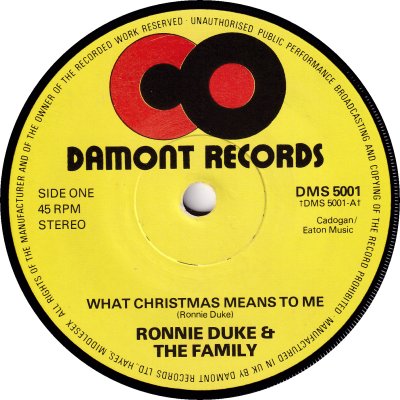
Damont Records was based in Hayes, Middlesex. It was formed by David L. Miller, an American specialist in budget-priced records, who had been operating in that market since the late 1950s in his home country. 'Record Retailer' of the 5th of February 1972 marked Damont's arrival, and said that Monty Presky, previously with Pye, was to become the company's managing director; Miller's Stereo Gold Award series of albums had been pressed by Pye, and Presky had been closely associated with Pye's budget-priced Golden Guinea and Marble Arch labels, so the pair had a fair amount of common ground. Miller had previously founded pressing plants in America and Germany, and he did the same here: 'Music Week' of the 29th of July 1972 reported that plans for a plant in Nottingham were 'nearing completion', but in the event a location in Hayes, Middlesex, was decided upon. 'MW' of the 26th of August 1972 gave Damont's headquarters as being at York House, Empire Way, Wembley. Stereo Gold Award was relaunched by Damont that same year; it was joined by the LP-only Happy House (for children's records) in 1973 and by Stereo Galaxy in 1974.
The manufacturing side of Damont's operations took on an increasing significance during the '70s. 'MW' of the 19th of February 1977 stated that pressing provided 50% of the company's turnover, and that every major except Decca had had contract pressings done. According to the report Damont had ten 12" presses and four 7" ones, all of which were booked solid till the end of April. This attracted the interest of WEA, who were looking to acquire their own independent manufacturing facilities, and 'MW' of the 9th of July 1977 broke the news that the company had gained a majority holding in Damont by buying David Miller's shares. According to the report, Monty Presky was to continue as managing director.
It was shortly after this that the Damont label as such was introduced. 'MW' of the 3rd of December 1977 announced its arrival and revealed that its first release was to be an album of music from the film 'Star Wars'; a special deal had been arranged between Damont and WEA for distribution. The article said that the album was a 'one-off' but that Presky was contemplating further releases on his new label. Further releases duly followed over the course of the next two-and-a-bit years, but there weren't many of them - just three more albums, a four-album boxed set, and three singles. In addition there were an EP of selections from the 'Star Wars' LP and a single-sided 7" offering an excerpt from the 'Close Encounters Of The Third Kind' album, but these were promotional items - the former was sent out by courtesy of Chivers Jelly and Spar. The singles, which were numbered in the DMS-5000s, featured MOR material. Despite the introduction of its own label Damont continued to keep its eye on the 'manufacturing' ball, and 'MW' of the 14th of October 1978 was able to reveal that the company was introducing a new, 'faster and simpler', process for making 'picture discs' - the picture was given a clear PVC coating, and the resultant 'sandwich' was then pressed in the usual way.
In 1973 department store Woolworths had signed an agreement with Damont by virtue of which they became the sole stockists of Stereo Gold Award albums; Presky was quoted in 'Billboard' of the 15th of September 1973 as saying that for consumer purposes SGA was effectively becoming Woolworth's own label, though it remained very much a Damont company. In 1979, however, 'BB' of the 17th of February broke the news that Woolworths was introducing its own label, 'Chevron' (q.v.). Losing such a major outlet was a blow to Damont, and Monty Presky told the paper that in future the company would be concentrating on higher-priced repertoire and on developing its custom pressing business. The pressing arm continued to flourish but the repertoire side of things seems to have fallen away; as a label, Damont doesn't appear to have survived into 1981.



Copyright 2006 Robert Lyons.

